The Ph based lip balm market is estimated to be valued at USD 140.7 million in 2025 and is projected to reach USD 227.0 million by 2035, registering a compound annual growth rate (CAGR) of 4.9% over the forecast period.
The absolute dollar opportunity over this period is USD 86.3 million, representing the additional revenue potential from 2025 to 2035. This growth reflects increasing consumer demand for specialized lip care products and expanding adoption in personal care routines. Companies can capitalize on this opportunity by expanding product lines, enhancing distribution networks, and targeting emerging markets. The incremental growth provides a clear financial incentive for strategic investment and business planning throughout the decade. From a business perspective, the USD 86.3 million absolute dollar opportunity highlights significant revenue potential for both established players and new entrants.
With the market gradually increasing from USD 140.7 million in 2025 to USD 227.0 million in 2035 at a CAGR of 4.9%, firms can plan phased investments and scale operations strategically. By focusing on high-demand regions, optimizing supply chains, and improving product availability, stakeholders can capture incremental revenue. This predictable growth trajectory allows companies to strengthen market positioning, expand customer base, and achieve sustained profitability over the ten-year period.
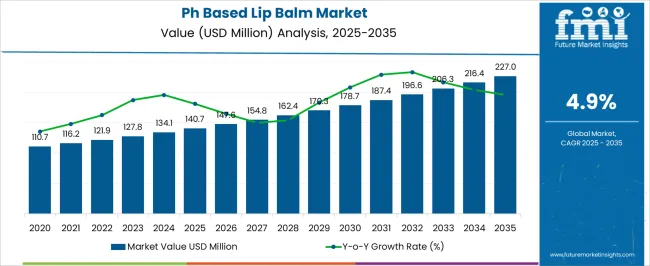
| Metric | Value |
|---|---|
| Ph Based Lip Balm Market Estimated Value in (2025 E) | USD 140.7 million |
| Ph Based Lip Balm Market Forecast Value in (2035 F) | USD 227.0 million |
| Forecast CAGR (2025 to 2035) | 4.9% |
A breakpoint analysis for the pH based lip balm market highlights key thresholds where growth accelerates or strategic adjustments are needed. With the market valued at USD 140.7 million in 2025 and projected to reach USD 227.0 million by 2035 at a CAGR of 4.9%, early breakpoints occur around USD 162.4–170.3 million. These levels represent the initial phase of notable market expansion, reflecting rising consumer demand for specialized lip care products. Recognizing these breakpoints allows companies to allocate resources efficiently, expand distribution channels, and enhance marketing strategies to capture incremental revenue during periods of accelerated growth.
Later-stage breakpoints appear between USD 196.6–216.4 million as the market approaches maturity and competition intensifies. Surpassing these thresholds may require businesses to refine pricing strategies, optimize operational efficiency, and strengthen relationships with key retailers and distributors to sustain growth momentum. Monitoring these breakpoints ensures companies can anticipate shifts in demand and adjust production, marketing, and sales strategies accordingly. By aligning strategic actions with these critical thresholds, stakeholders can maximize revenue potential, reinforce market positioning, and navigate the steady growth trajectory from 2025 to 2035 with informed precision.
The Ph Based Lip Balm market is experiencing robust growth, driven by rising consumer awareness about lip health and the benefits of maintaining optimal pH balance in skincare products. Increasing demand for formulations that provide both cosmetic appeal and therapeutic benefits has expanded the market significantly.
The preference for multifunctional lip care solutions, especially those that protect against environmental stressors while enhancing appearance, is shaping the future of this market. Growing interest in natural and clean beauty products, combined with the rise of personalized skincare regimens, is further encouraging innovation in ph balanced lip balms.
Investments in research and development have accelerated the introduction of products with enhanced moisturizing and protective properties As consumers increasingly seek lip care products that align with wellness trends, the market is expected to maintain steady growth, particularly across health-conscious and younger demographics.
The ph based lip balm market is segmented by product, form, ingredients, end use, price range, finish type, distribution channel, and geographic regions. By product, ph based lip balm market is divided into tinted lip balm and non-tinted lip balm. In terms of form, ph based lip balm market is classified into balm, gel, stick, cream, pencil, and others (liquid, tube). Based on ingredients, ph based lip balm market is segmented into natural and synthetic. By end use, ph based lip balm market is segmented into women and men. By price range, ph based lip balm market is segmented into medium, low, and high. By finish type, ph based lip balm market is segmented into glossy, matte, natural, and others (satin, shimmery). By distribution channel, ph based lip balm market is segmented into online retail and offline. Regionally, the ph based lip balm industry is classified into North America, Latin America, Western Europe, Eastern Europe, Balkan & Baltic Countries, Russia & Belarus, Central Asia, East Asia, South Asia & Pacific, and the Middle East & Africa.
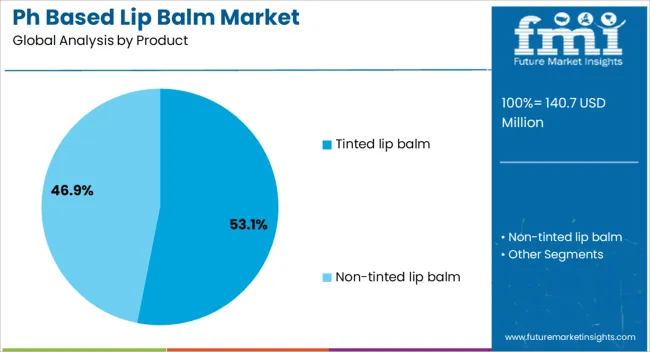
The tinted lip balm product segment is projected to hold 53.1% of the ph based lip balm market revenue share in 2025, making it the leading product type. This position is being driven by consumer preference for lip care products that combine color enhancement with protective benefits.
The tinted variety offers the advantage of providing an aesthetic appeal alongside pH balanced moisturizing effects, encouraging daily use as part of beauty routines. The versatility of tinted lip balms in addressing both functional lip protection and cosmetic trends has resulted in their strong market acceptance.
Additionally, growing demand for convenient, all-in-one lip solutions in urban and younger consumer groups has contributed to this segment’s dominance The segment’s growth is supported by continuous formulation innovations that improve pigment stability without compromising lip health.
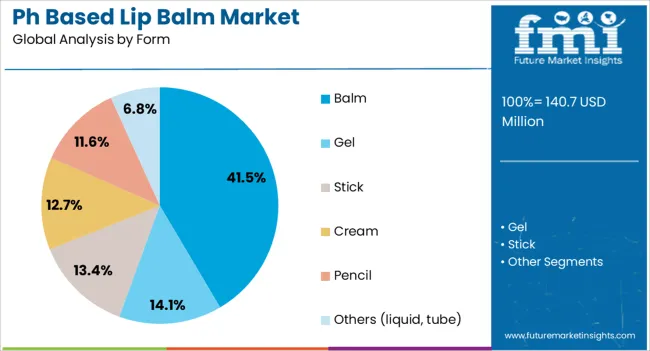
The balm form segment is expected to account for 41.5% of the overall market revenue in 2025, reflecting its status as the preferred delivery format. This is attributed to the balm’s ease of application, portability, and its ability to provide long-lasting hydration and protection.
The solid and smooth texture of balms allows for precise and comfortable application, making them favored for everyday use. Additionally, the balm form supports incorporation of natural ingredients and pH balancing agents without sacrificing product stability.
Consumers valuing functional and sensory attributes continue to prefer this form, which is widely distributed and accessible As a result, the balm segment has seen steady adoption across various demographics and geographical markets.
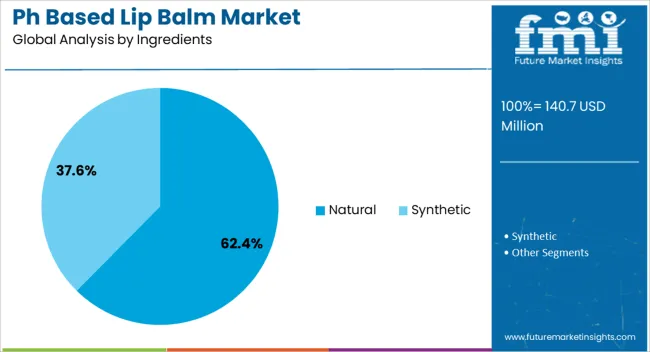
The natural ingredients segment is anticipated to command 62.4% of the market revenue share in 2025, underscoring its dominant role. This prominence is driven by increasing consumer demand for clean label products free from synthetic additives and harmful chemicals.
Natural ingredients are being favored for their perceived safety, compatibility with sensitive skin, and ability to maintain the lip’s natural pH balance while providing nourishment. The rising trend toward sustainable and eco-friendly beauty products is reinforcing this preference.
The incorporation of botanicals, plant-based oils, and natural waxes aligns with evolving consumer values focused on health and environmental responsibility The segment’s growth is further enabled by ongoing advancements in natural formulation technologies that enhance efficacy and sensory appeal.
The pH-based lip balm market is growing due to rising consumer interest in personalized skincare, sensitive skin care solutions, and natural cosmetic products. North America and Europe lead with premium formulations emphasizing hydration, pH balance, and protective ingredients. Asia-Pacific is witnessing rapid growth driven by growing beauty awareness, e-commerce expansion, and increasing demand for multifunctional lip care. Manufacturers differentiate through formulation, packaging, texture, and ingredient transparency. Regional variations in skin types, climate, and purchasing behavior influence product adoption, marketing strategies, and competitive positioning globally.
pH-based lip balms vary in active ingredients, hydration agents, and protective compounds. North America and Europe focus on premium ingredients, natural oils, and pH-balanced formulas targeting sensitive lips, UV protection, and long-lasting hydration. Asia-Pacific markets prioritize affordable formulations with multifunctional benefits such as moisturizing and slight tint. Differences in ingredient selection affect skin compatibility, consumer satisfaction, and repeat purchase behavior. Leading global suppliers invest in clinically tested, innovative formulations, while regional producers offer budget-friendly options with basic functionality. These contrasts influence regional adoption, product positioning, and competitiveness in cosmetic and personal care markets.
Packaging ergonomics, portability, and ease of application are key adoption factors. Europe and North America emphasize sleek, compact tubes, twist-up sticks, and refillable options suitable for premium positioning. Asia-Pacific consumers often prefer simple, multifunctional packaging at affordable price points. Differences in packaging affect convenience, repeat purchases, and brand perception. Suppliers offering user-friendly, aesthetically appealing, and travel-ready products capture premium market segments, while regional manufacturers focus on practicality and cost-effectiveness. Packaging contrasts influence adoption, marketing strategies, and differentiation between professional and mass-market segments across regions.
pH-based lip balms are sold through online stores, specialty beauty retailers, supermarkets, and pharmacies. Europe and North America emphasize e-commerce platforms, professional beauty channels, and high-end retail outlets. Asia-Pacific relies on supermarkets, local retailers, and growing online marketplaces targeting mass consumers. Differences in distribution affect product visibility, accessibility, and adoption speed. Leading suppliers strengthen penetration through multi-channel strategies and promotional campaigns, while regional producers focus on price-sensitive bulk distribution. Distribution contrasts impact consumer reach, brand awareness, and long-term market growth across mature and emerging markets.
Regional variations in skin types, climate, and lifestyle affect lip balm demand. Europe and North America emphasize protection against dryness, UV exposure, and extreme weather, driving adoption of pH-balanced, premium lip care. Asia-Pacific growth is fueled by humid and tropical climates, urban pollution, and cosmetic-conscious consumers, favoring multifunctional, affordable balms. Differences in skin needs influence formulation, marketing campaigns, and product adoption. Suppliers offering tailored solutions for regional conditions gain competitive advantages, while regional producers meet basic protective requirements. Understanding these contrasts allows optimized product features, marketing strategies, and regional expansion planning.
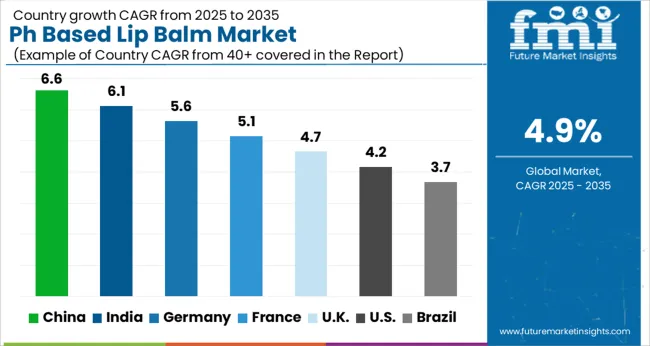
| Country | CAGR |
|---|---|
| China | 6.6% |
| India | 6.1% |
| Germany | 5.6% |
| France | 5.1% |
| UK | 4.7% |
| USA | 4.2% |
| Brazil | 3.7% |
The global pH-based lip balm market was projected to grow at a 4.9% CAGR through 2035, driven by demand in personal care, skincare, and cosmetic applications. Among BRICS nations, China recorded 6.6% growth as large-scale production facilities were commissioned and compliance with product quality and safety standards was enforced, while India at 6.1% growth saw expansion of manufacturing units to meet rising regional consumer demand. In the OECD region, Germany at 5.6% maintained substantial output under strict cosmetic and industrial regulations, while the United Kingdom at 4.7% relied on moderate-scale operations for personal care and beauty product applications. The USA, expanding at 4.2%, remained a mature market with steady demand across home and professional skincare segments, supported by adherence to federal and state-level safety and quality standards. This report includes insights on 40+ countries; the top five markets are shown here for reference.
PH based lip balm market in China is growing at a CAGR of 6.6%. Between 2020 and 2024, growth was driven by rising awareness of skin and lip health, increasing disposable income, and adoption of natural and dermatologically tested cosmetic products. Manufacturers focused on safe, moisturizing, and pH-balanced formulations suitable for different skin types. E-commerce and retail expansion improved accessibility across urban and semi-urban areas. In the forecast period 2025 to 2035, growth is expected to accelerate with introduction of multifunctional, herbal, and eco-friendly lip balms integrated with sun protection and anti-aging properties. Rising consumer preference for premium and sustainable products, along with skincare awareness campaigns, will further support market growth. China remains a leading market due to large urban population, growing beauty industry, and increasing health-conscious consumers.
PH based lip balm market in India is growing at a CAGR of 6.1%. Historical period 2020 to 2024 saw growth supported by rising awareness of lip care, increasing disposable income, and demand for natural and dermatologically safe cosmetic products. Manufacturers focused on moisturizing, pH-balanced, and herbal formulations suitable for diverse climates. In the forecast period 2025 to 2035, market growth is expected to continue with adoption of multifunctional, sun-protective, and eco-friendly lip balms. Expansion of organized retail, e-commerce channels, and beauty awareness campaigns will further boost adoption. India is projected to maintain strong growth due to growing urban population, increasing skincare consciousness, and rising preference for premium and safe cosmetic products.
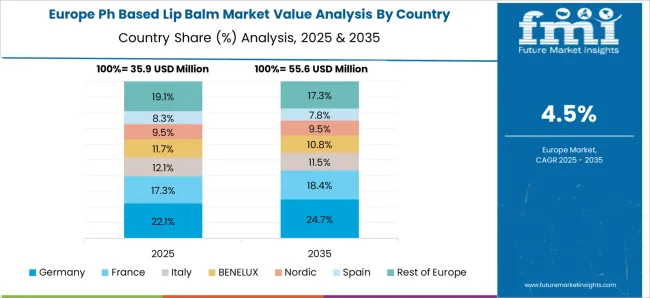
PH based lip balm market in Germany is growing at a CAGR of 5.6%. Between 2020 and 2024, growth was supported by rising consumer preference for natural, dermatologically tested, and sustainable cosmetic products. Manufacturers focused on safe, pH-balanced, and eco-friendly formulations suitable for sensitive skin. In the forecast period 2025 to 2035, growth is expected to continue steadily with adoption of multifunctional, herbal, and premium lip balms with sun protection and anti-aging benefits. Consumer emphasis on sustainability, product safety, and multifunctionality will further drive adoption. Germany remains a key European market due to high disposable income, awareness of skin health, and demand for premium and natural cosmetic solutions.
PH based lip balm market in the United Kingdom is growing at a CAGR of 4.7%. During 2020 to 2024, adoption was driven by rising lip care awareness, preference for safe cosmetic products, and expansion of retail and e-commerce channels. Manufacturers focused on pH-balanced, moisturizing, and herbal formulations suitable for sensitive lips. In the forecast period 2025 to 2035, market growth is expected to continue moderately with adoption of multifunctional, premium, and eco-friendly lip balms offering sun protection and antioxidant benefits. Expansion of beauty awareness campaigns and growing consumer preference for sustainable products will further support growth. The United Kingdom market demonstrates stable growth with emphasis on product safety, functionality, and sustainability.
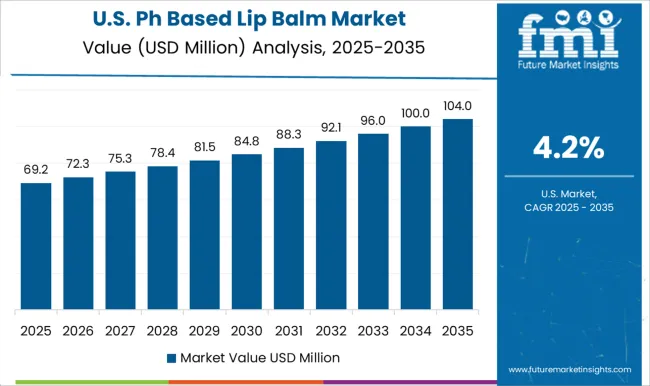
PH based lip balm market in the United States is growing at a CAGR of 4.2%. Historical period 2020 to 2024 saw growth fueled by rising skincare and lip care awareness, preference for natural and safe cosmetic products, and expansion of retail and e-commerce distribution. Manufacturers focused on pH-balanced, moisturizing, and dermatologically safe formulations. In the forecast period 2025 to 2035, growth is expected to continue steadily with adoption of multifunctional, herbal, and premium lip balms integrated with sun protection, anti-aging, and eco-friendly features. Increasing consumer preference for safe, sustainable, and multifunctional cosmetic products will further drive market expansion. The United States market demonstrates consistent growth with emphasis on safety, functionality, and natural ingredients.
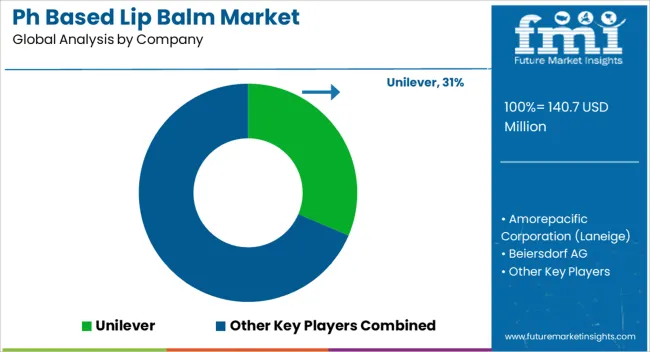
The pH based lip balm market is supplied by Unilever, Amorepacific Corporation (Laneige), Beiersdorf AG, Biossance (Amyris, Inc.), Blistex Inc., Burt's Bees, Carma Laboratories, Inc. (Carmex), ChapStick (A Pfizer Brand), Dr. Pawpaw (Dr. Paw Paw Ltd.), Eos Products, LLC (Evolution of Smooth), Fresh, Inc. (A LVMH Company), L’Oréal, Revlon, Inc., Sun Bum, and The Body Shop International Limited (Natura &Co). Competition is influenced by product formulation, skin compatibility, ingredient transparency, and brand trust. Unilever and Laneige brochures emphasize scientifically balanced pH formulas, hydration retention, and natural extracts. Burt’s Bees and Blistex highlight certified organic ingredients, hypoallergenic formulations, and antioxidant benefits.
Observed trends include consumer preference for cruelty-free certifications, flavor and fragrance variations, and SPF inclusion. Market strategies focus on consumer targeting, formulation differentiation, and channel diversification. Beiersdorf and Carmex target mass retail and pharmacy segments with clinically tested, dermatologist-approved products. Biossance and Eos emphasize sustainable ingredient sourcing, eco-friendly packaging, and digital-first marketing campaigns. Fresh and L’Oréal aim at premium skincare segments with multifunctional benefits, including moisture retention, barrier repair, and sun protection. ChapStick and Dr. Pawpaw leverage wide distribution and seasonal product variations to maintain brand visibility.
Observed industry practices include influencer collaborations, targeted regional launches, and portfolio expansion to include tinted and medicated options. Product brochures provide details on pH value, ingredient composition, hydration performance, SPF rating, packaging format, and application benefits. Laneige and Burt’s Bees datasheets specify emollient types, antioxidant content, and allergen information. Blistex and Carmex highlight protective properties, soothing effects, and recommended usage frequency. Unilever and Eos brochures include clinically validated pH stability, texture evaluation, and flavor profile information. Verified technical and compositional data assist formulators, retailers, and consumers in selecting lip balms optimized for skin health, comfort, and daily protection.
| Item | Value |
|---|---|
| Quantitative Units | USD 140.7 million |
| Product | Tinted lip balm and Non-tinted lip balm |
| Form | Balm, Gel, Stick, Cream, Pencil, and Others (liquid, tube) |
| Ingredients | Natural and Synthetic |
| End Use | Women and Men |
| Price Range | Medium, Low, and High |
| Finish Type | Glossy, Matte, Natural, and Others (satin, shimmery) |
| Distribution Channel | Online Retail and Offline |
| Regions Covered | North America, Europe, Asia-Pacific, Latin America, Middle East & Africa |
| Country Covered | United States, Canada, Germany, France, United Kingdom, China, Japan, India, Brazil, South Africa |
| Key Companies Profiled | Unilever, Amorepacific Corporation (Laneige), Beiersdorf AG, Biossance (Amyris, Inc.), Blistex Inc., Burt's Bees, Carma Laboratories, Inc. (Carmex), ChapStick (A Pfizer Brand), Dr. Pawpaw (Dr. Paw Paw Ltd.), Eos Products, LLC (Evolution of Smooth), Fresh, Inc. (A LVMH Company), L'Oréal, Revlon, Inc., Sun Bum, and The Body Shop International Limited (Natura &Co) |
| Additional Attributes | Dollar sales vary by product type, including moisturizing, medicated, tinted, and flavored lip balms; by application, such as daily care, sun protection, and therapeutic use; by end-use, spanning individual consumers, beauty salons, and retail outlets; by region, led by North America, Europe, and Asia-Pacific. Growth is driven by rising lip care awareness, demand for skin-friendly formulations, and cosmetic innovation. |
The global ph based lip balm market is estimated to be valued at USD 140.7 million in 2025.
The market size for the ph based lip balm market is projected to reach USD 227.0 million by 2035.
The ph based lip balm market is expected to grow at a 4.9% CAGR between 2025 and 2035.
The key product types in ph based lip balm market are tinted lip balm and non-tinted lip balm.
In terms of form, balm segment to command 41.5% share in the ph based lip balm market in 2025.






Full Research Suite comprises of:
Market outlook & trends analysis
Interviews & case studies
Strategic recommendations
Vendor profiles & capabilities analysis
5-year forecasts
8 regions and 60+ country-level data splits
Market segment data splits
12 months of continuous data updates
DELIVERED AS:
PDF EXCEL ONLINE
Pharmaceutical Grade Magnesium Sulfate Market Size and Share Forecast Outlook 2025 to 2035
Pharmaceutical Secondary Packaging Market Size and Share Forecast Outlook 2025 to 2035
Pharmaceutical Glass Packaging Market Size and Share Forecast Outlook 2025 to 2035
Pharmaceutical Manufacturing Equipment Market Forecast and Outlook 2025 to 2035
Physical Therapy Supplies Market Size and Share Forecast Outlook 2025 to 2035
Pharma and Healthcare Social Media Marketing Market Size and Share Forecast Outlook 2025 to 2035
Phenylethanol Market Forecast and Outlook 2025 to 2035
Phytopathological Disease Diagnostics Market Forecast and Outlook 2025 to 2035
Pharmaceutical Plastic Bottle Market Forecast and Outlook 2025 to 2035
Pharmaceutical Grade Sodium Carbonate Market Forecast and Outlook 2025 to 2035
Pharmaceutical Industry Analysis in Saudi Arabia Forecast and Outlook 2025 to 2035
Photoresist Chemical Market Forecast and Outlook 2025 to 2035
Photomask Inspection Market Forecast and Outlook 2025 to 2035
Pharmaceutical Packaging Market Size and Share Forecast Outlook 2025 to 2035
Phosphotungstic Acid Market Size and Share Forecast Outlook 2025 to 2035
Phosphated Ester Market Size and Share Forecast Outlook 2025 to 2035
Pharmaceutical Grade Sodium Chloride Market Size and Share Forecast Outlook 2025 to 2035
Pharmaceutical Plastic Packaging Market Size and Share Forecast Outlook 2025 to 2035
Photostability Chamber Market Size and Share Forecast Outlook 2025 to 2035
Pharmaceutical Plastic Pots Market Size and Share Forecast Outlook 2025 to 2035

Thank you!
You will receive an email from our Business Development Manager. Please be sure to check your SPAM/JUNK folder too.
Chat With
MaRIA